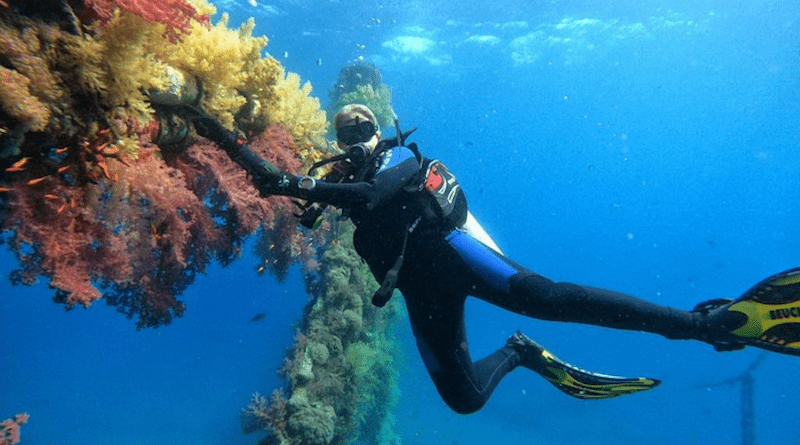Plastic Additives Contaminate The Sea And Selectively Harm Corals’ Reproduction Processes
A new study by Tel Aviv University and the Interuniversity Institute for Marine Sciences in Eilat examined the effect of plastic additives on the reproductive process and larvae development of corals and other organisms commonly found in the coral reef of Eilat. Plastic additives are chemicals that are added to plastic products during manufacturing, and many of them are known to be endocrine disrupting compounds. The current study shows that these chemicals can have species-specific effects that may damage the population structure and biodiversity of coral reefs.
The study was led by Ph.D. student Gal Vered of the Interuniversity Institute for Marine Sciences in Eilat and Tel Aviv University, and Prof. Noa Shenkar of Tel Aviv University’s School of Zoology in the Wise Faculty of Life Sciences and the Steinhardt Museum of Natural History. The study was published in the prestigious journal Environmental Pollution.
The researchers focused on four organisms: a stony coral, a soft coral, a fire coral and a solitary ascidian. These organisms play an important role in the ecology of tropical coral reefs, and damage to their reproduction and development may affect the structure of the reef community.
In addition, the researchers examined four chemical additives that are widely used in plastic products and which have been found in seawater in tropical areas inhabited by coral reefs. Two of these were phthalate chemicals, which are used to soften and increase the flexibility of different types of plastic and can be found in a wide variety of consumer products such as food packaging, toys, medical devices, and adhesives. The others were 4-nonylphenol a stabilizer used in plastic packaging and as an additive in cleaning agents, and bisphenol A found in polycarbonate plastic that is used for food and beverage packaging, baby bottles, boxes, and more. The European Chemicals Agency has classified bisphenol A as a substance that may cause damage to human fertility, based on evidence found in laboratory animals.
Gal Vered explains: “Plastic additives are chemical additives that are incorporated into plastic products during the manufacturing process. These substances reach marine environments through plastic waste and wastewater. Some of them are known to activate or suppress hormonal processes, and can therefore disrupt biological systems. However, their effects on organisms in coral reefs have hardly been studied. The structure of the coral reef population depends on the success of the reproduction, development and settlement of corals and other reef organisms. Interference with their hormonal systems may affect the chances of success of these processes, and an uneven effect on the different species may lead to a change in the community’s structure and damage to the entire system.”
The researchers conducted a series of exposure experiments in which the effects of the plastic additives were tested at environmentally-relevant concentrations in seawater, and at higher laboratory concentrations. The parameters measured were fertilization, larvae development, larvae survival, and larvae settlement and metamorphoses.
The environmentally-relevant concentration of 4-nonylphenol was found to inhibit larvae settlement in the soft coral, while a high concentration of the same compound damaged the fertilization, development and settlement of all the studied organisms. The higher laboratory concentration of one of the studied phthalate chemicals damaged the settlement only of the stony coral larvae, and not of the other organisms’ reproductive products. These findings add to the accumulating evidence that plastic pollution has a selective effect on different species.
Prof. Shenkar: “Our findings demonstrate plastic additives’ negative and selective effects on the development and reproduction of coral reef organisms. The environmentally-relevant concentrations used in our experiments were concentrations found in seawater; alarmingly, some had deleterious effects on organisms’ reproduction. Nevertheless, concentration within organisms’ tissues may reach higher levels as these compounds can potentially bioaccumulate. To better understand the impact of plastic additives on this endangered ecosystem, we suggest developing better methods for measuring the actual concentrations within the tissues of the organisms to produce relevant risk assessments.”
Gal Vered: “Climate change, ocean acidification, and ongoing anthropogenic stressors place coral reefs at existential risk. Most of the coral reefs in the world are found in developing countries where the human population is expanding rapidly and waste management is lacking. Steps towards preventing plastic waste from reaching the environment include proper local waste management that reduces transportation of waste, and sustainable consumption of products regulated for additives.”
The researchers conclude: “We emphasize the importance of proper waste management that will reduce the presence of plastic waste from reaching the marine environment, as well as the need for methods to measure the concentration of chemicals inside the bodies of organisms, in order to assess the possible risk to their reproductive and developmental processes.”

